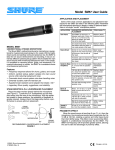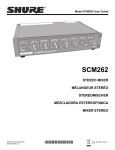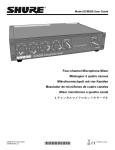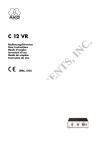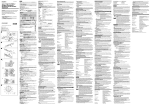Download Shure SM94-LC microphone
Transcript
Model SM94 User Guide • Accepts 12 to 48 Vdc phantom power • Rugged all–metal construction • Usable over wide range of environmental conditions • Built–in battery power backup • Optional foam windscreen SPECIFICATIONS Type Cardioid condenser (electret bias) Frequency Response MODEL SM94 UNIDIRECTIONAL CONDENSER MICROPHONE The Model SM94 is a unidirectional electret condenser microphone tailored to the instrument miking needs of professional musicians and sound engineers in both live performance and sound recording. Its smooth, flat frequency response is free of either a “presence peak” or a low-frequency rolloff, making it a perfect choice for all types of musical instruments. The SM94 is equally at home in sound reinforcement systems or in sound studios and motion picture/TV scoring stages. When used with the optional windscreen, the SM94 can be used by vocalists and speechmakers who desire a wide, flat response with minimum coloration. The SM94 can be powered by any phantom power source, or by an internal 1.5-volt AA battery. The battery, which serves as a backup power source in the event of phantom power failure, can provide up to 5,000 hours of continuous operation. The SM94 is supplied with a swivel adapter for use on a microphone stand, boom or gooseneck, and a zippered vinyl storage bag. Model SM94-LC is supplied without a cable. Accessories include a foam windscreen (A3WS), two-channel phantom power supply (PS1A), and 7.6 m (25 ft.) microphone cable (C25J). 40 to 16,000 Hz (see Figure 1) TYPICAL FREQUENCY RESPONSE FIGURE 1 Polar Pattern Cardioid (unidirectional)–uniform with frequency, symmetrical about axis (see Figure 2) Features • Wide, flat response for optimum musical instrument sound reproduction • Full spectrum sound–no presence peak or low-end rolloff • Cardioid polar pattern that is uniform with frequency and symmetrical about axis for maximum rejection of unwanted sound and minimum of-axis coloration • Very low susceptibility to RF and electromagnetic hum • Low distortion output and wide dynamic range for variety of load impedances • Shock–mounted cartridge for reduced handling noise ©2005, Shure Incorporated 27C2689 (Rev. 5) TYPICAL POLAR PATTERNS FIGURE 2 Printed in U.S.A. Output Impedance Connector Rated at 150 Ω; 200 Ω actual XLR professional audio 3-Pin Recommended Minimum Load Impedance Case 800 Ω Steel and brass construction with gray finish and stainless steel mesh grille Sensitivity (at 1,000 Hz) Open Circuit Voltage: –49 dBV/Pa (3.5 mV) (phantom) –50 dBV/Pa (3.2 mV) (battery) (1 Pa = 94dB SPL) Dimensions See Figure 3 Output Clipping Level (1 kHz, 3% THD) 800-Ω Load–14 dBV (0.63 V) (phantom), 1% THD; –23 dBV (0.71 V) (battery), 3% THD Total Harmonic Distortion < 0.25% (130 dB SPL at 250 Hz into 800 Ω load) Maximum SPL OVERALL DIMENSIONS FIGURE 3 800 Ω Load: 141 dB (phantom), 123 dB (battery) Hum Pickup Weight Net 250 grams (8.8 oz) less battery Packaged SM94-LC: 949.7 grams (2 Ib 1 1/2 oz) –3 dB equivalent SPL in a 1 millioersted field (60 Hz) Output Noise (equivalent sound pressure levels; measured with true rms voltmeter) Certification Eligible to bear CE Marking. Conforms to European EMC Directive 89/336/EEC. Meets applicable tests and performance criteria in European Standard EN55103 (1996) parts 1 and 2, for residential (E1) and light industrial (E2) environments. 22 dB typical, A-weighted 25 dB typical, weighted per DIN 45 505 Dynamic Range *S/N ratio is difference between microphone output at 94 dB SPL and microphone self-noise A-weighted. 119 dB (phantom); 101 dB (battery) (maximum SPL, 2000–Ω load, to A–weighted noise level) OPERATION Signal-to-Noise Ratio The SM94 is designed for phantom powering by a Shure PS1A Power Supply, or by any microphone power supply providing 12 to 48 Vdc phantom voltage, or by any microphone mixer (such as the Shure SCM262 and SCM268) with a phantom supply. In addition, the SM94 can be powered by a single 1.5-volt AA alkaline battery. The battery also serves as a backup in case of phantom power failure. A new alkaline battery will provide up to 5,000 hours of continuous microphone operation. Note that the microphone is powered at all times during battery operation but there is no battery drain during phantom-powered operation. 72 dB (IEC 651)* at 94 dB SPL Overvoltage Protection Maximum External Voltage Applied to Pins 2 and 3 with respect to Pin 1: +52Vdc Reverse polarity protected to 75 Vdc Polarity Positive pressure on diaphragm produces positive voltage on pin 2 relative to pin 3 Cartridge Capacitance BATTERY OPERATION Disconnect the microphone cable, and unscrew the SM94 handle, turning counterclockwise (from top) until the handle is free of the microphone body. Slide the handle away from the grille, exposing the battery compartment. Insert a new battery (or replace the old battery), observing the polarity marking in the compartment. Slide the handle toward the grille, and tighten the handle by turning it clockwise (from top). 24 pF Power Phantom Operation Supply Voltage: 11 to 52 Vdc, (+) pins 2 and 3 Current Drain: 1.0 to 1.2 mA max. at 52 Vdc Battery Operation Type: 1.5 V alkaline, AA size (NEDA 15A) Life: Up to 5,000 hours with fresh battery WIND NOISE Use the optional foam windscreen (A3WS) when using the SM94 outdoors on a windy day, indoors near strong air currents such as air-moving equipment, or as a vocal microphone. Environmental Conditions Temperature: Storage: . . . . . . . –29° to 74° C (–20° to 165° F) Operating: –6.7° to 49° C (20° to 120° F) CIRCUIT DESCRIPTION A block diagram of the SM94 is shown in Figure 4. The capacitor cartridge is followed by an impedance converter stage. This stage has an active load to obtain good load-driving capability with the low battery voltage of 1.5 volts. The audio signal is transformer-coupled for a balanced output to the microphone connector. An active power supply circuit Humidity: Storage . . . . 0–95% relative humidity at room temperature (72° to 80° F, 22° to 27° C) 2 ARCHITECTS' SPECIFICATIONS regulates the phantom voltage, and the 1.5-volt battery provides instantaneous backup in case the phantom power supply fails. The regulator/reverse voltage protector provides built-in protection against miswired cables and equipment. The microphone shall be a condenser microphone with a frequency response of 40 to 16,000 Hz. It shall have a cardioid directional characteristic, with cancellation at the sides of 6 dB and a minimum cancellation at the rear of 15 dB at 1 kHz. The microphone shall have a rated output impedance of 150 Ω for connection to microphone inputs of 150 Ω or higher. The open circuit voltage shall be –49 dBV/Pa (3.5 mV) dB equals 1 volt per Pascal). The overall dimensions shall be 190.5 mm (7–1/2 in.) in length by 27.7 mm (1–3/32 in.) in diameter. The handle diameter shall be 24.1 mm (15/16 in.) The weight shall be 250 grams (8.8 oz). The microphone shall be capable of being powered by a phantom power supply with an output of 11 to 52 Vdc, or by a mixer, audio console or tape recorder capable of supplying 11 to 52 Vdc, or by an internal 1.5-volt battery. The microphone shall be a Shure Model SM94. TROUBLESHOOTING Due to the circuit complexity of the SM94, only basic servicing is recommended. The following steps should be taken if problems arise: 1. Check the power supply output voltage. For the Shure PS1A, this should be 21.5, ±1.5 Vdc, open circuit. 2. Check the voltage on connector pins 2 and 3 (at back of connector, with cable connector removed from shell, but connected to microphone). The voltage at pins 2 and 3 with reference to pin 1 should be between 10 and 48 Vdc. 3. If the microphone does not work on phantom power, battery operation may still be possible. Similarly, if battery operation is impaired, the SM94 may still operate on phantom power. In either case, you should send the microphone to an Authorized Shure Service Center at your earliest opportunity. FURNISHED ACCESSORIES Swivel Adapter .................................................................. A25D Carrying/Storage Bag ...................................................... 26A13 OPTIONAL ACCESSORIES Phantom Power Supply.................................................... PS1A Switch-Selectable Attenuator ........................................ A15AS Isolation Mount ................................................................. A53M Windscreen ..................................................................... A3WS 7.6 m (25 ft.) Cable .......................................................... C25J REPLACEMENT PARTS Screen and Grille ......................................................... RK255G BALANCED TRANSFORMER CAPACITOR CARTRIDGE FET IMPEDANCE CONVERTER WITH ACTIVE LOAD CLASS A COMPOUND AMPLIFIER LF RESPONSE FILTER RFI FILTER REGULATOR/ REVERSE VOLTAGE PROTECTOR BATTERY BLOCK DIAGRAM FIGURE 4 3 MODÈLE SM94 MICROPHONE A CONDENSATEUR UNIDIRECTIONNEL Rapport signallbruit 71 dB (IEC 651) à 94 dB de niveau de pression acoustique CARACTÉRISTIQUES Protection contre survoltage et inversion de polarité Tension externe maximum appliquée aux broches 2 et 3 par rapport à la broche 1 : + 52 V cont. Protection contre inversion de polarité jusqu'à 100 V Type Cardioïde à Condensateur (Electret) Réponse en fréquence Phase 40 à 16 000 Hz (Voir Figure 1) Une pression positive sur le diaphragme produit une tension positive sur la broche 2 par rapport à la broche 3 Capacité de la cellule 24 pF Alimentation Alimentation fantôme Tension d'alimentation : de 11 à 52 volts continus, broches (+) 2 et 3 Perte d'intensité : 2,0 mA Alimentation par pile Type de pile : alcaline 1,5 V (IEC LR6) Longevité Jusqu'à 10 000 heures avec une pile neuve. RÉPONSE EN FRÉQUENCE FIGURE 1 Conditions d'Environnement Température Directivité Stockage . . . . . . . –29° à 74° C Fonctionnement –6.7° à 49° C Réponse cardioïde (unidirectionnelle)-uniforme avec la fréquence, symétrique sur axe (Voir Figure 2). Humidité Stockage ............... relative 0-95 % (22° to 27° C) Connecteur Professionnel à trois broches Boîtier En acier et aluminium, finition beige et grillage en acier inoxydable Dimensions Voir Figure 3 DIRECTIVITÉ FIGURE 2 Impédance de sortie 600 Ω; impédance de charge minimum recommandée: 800 Ω Niveau de sortie (à 1 000 Hz) DIMENSIONS FIGURE 3 Tension en circuit ouvert :–49 dBV/Pa (3.5 mV) Poids Niveau d'écrêtage (à 1 000 Hz) Net: 250 grammes Emballé: SM94-LC: 957 grammes Sous charge de 800 Ω: –18 dBV (0,13 V) (fantôme, 3% de distorsion harmonique); –21 dBV (89 mV) (pile, 3% de distorsion harmonique) Homologation Autorisé à porter la marque CE. Conforme à la directive CEM européenne 89/336/CEE. Conforme aux critères applicables de test et de performances de la norme européenne EN 55103 (1996) parties 1 et 2 pour les environnements résidentiels (E1) et d'industrie légère (E2). Niveau de pression acoustique maximum (à 1 000 Hz) Sous charge de 800 Ω: 131 dB (fantôme); 128 dB (pile) Sensibilité aux ronflements Niveau de pression-acoustique équivalent à –1 dB dans un champ de 1 millioersted (60 Hz) Bruit de sortie (Niveaux de pression acoustique équivalents mesurés avec voltmètre RMS réel) 22 dB Type, Pondéré A 26 dB Type, Pondéré DIN 45 405 Dynamique 111 dB (fantôme); 107 dB (pile) (niveau de pression acoustique maximum à niveau de bruit pondéré A) 4 MODE D'EMPLOI MODELL SM94 KON DENSATOR - RICHTMIKROFON Le SM94 est conçu pour être utilisé avec une alimentation fantame par un Shure modèle PS1A, ou par toute alimentation de microphone délivrant une tension fantôme de 12 à 48 Volts continus. De plus, le SM94 peut être alimenté par une pile alcaline de 1,5 volt (IEC type LR6). La pile sert aussi d'alimentation de secours en cas de panne de I'alimentation fantôme. Une pile alcaline neuve assure un fonctionnement continu de10 000 heures (maximum) du microphone. II est â noter que les performances du microphone dépendent dans une large mesure de I'état de charge de la pile. Celle-ci ne se décharge pas lorsque le micro fonctionne sur une alimentation fantôme. TECHNISCHE DATEN Type Kondensator-Mikrofon auf Electret-Basis Frequenzbereich 40 ... 16 000 Hz (siehe Abb. 1) ALIMENTATION PS1A Branchez le câble au SM94 et I la prise MICROPHONE de I'alimentation. L'alimentation utilise les deux fils symétriques pour amener le courant d'alimentation au microphone, et le blindage pour retour a la masse. Branchez la prise OUTPUT de I'alimentation I'entrée basse impédance d'un mélangeur, console, ou magnétophone. Un deuxième SM94 peut être branché au canal d'alimentation restant, de la même manière. FREQUENZBEREICH ABBILDUNG 1 Richtdiagramm FONCTIONNEMENT AVEC PILE Nierenformig, frequenz-symmetrisch zur Achse (siehe Abb. 2) Débrancher le câble du microphone et dévisser la poignée SM94 en tournant dans le sens contraire des aiguilles d'une montre (à partir du haut) jusqu' à ce que la poignée se détache du micro. Pour ouvrir le compartiment de la pile, éloigner la poignée du grillage en la faisant glisser. Mettre une nouvelle pile (ou remplacer I'ancienne) en respectant bien la polarité indiquée à I'intérieur du compartiment. Faire glisser la poignée vers le grillage et visser en tournant dans le sens des aiguilles d'une montre (à partir du haut). EFFETS DE VENT Le SM94 est en premier lieu conçu pour I'enregistrement d'instruments. Pour enregistrer avec ce micro en extérieur par jour de grand vent, en intérieur et à proximité de forts courants d'air (ventilateurs, climatiseurs etc...), ou bien pour enregistrer une voix dans quelque environnement que ce soit, il est recommandé d'utiliser un anti-vent souple (A3WS) en option. RICHTDIAGRAMM ABBILDUNG 2 Ausgangs⋅lmpedanz Nominal 600 Ω; empfohlener min. Lastwiderstand: 800 Ω ACCESSOIRES FOURNIS AVEC LE MICRO Ausgangspegel (bei 1 000 Hz) Adaptateur pivotant ............................................................A25D Sac de rangement............................................................ 26A13 Begrenzungspegel (1 000 Hz) Leerlaufspannung: –69 dBV (3,5 mV) 800 Ω Last: –18 dBV (0,13 V) (Phantom, 3% harmonische Verzerrung); –21 dBV (89 mV) (Batterie, 3% harmonische Verzerrung) ACCESSOIRES EN OPTION Bonnette anti-vent .............................................................A3WS Alimentation fant6me .........................................................PS1A Atténuateur à sélection par commutateur .......................A15AS Montage isolant................................................................. A53M Câble (7 m 65) ................................................................... C25J Maximaler Schalldruck 800 Ω Last: 131 dB (Phantom); 128 dB (Batterie) 2000 Ω Last: 133 dB (Phantom); 129 dB (Batterie) Brummeinstreuung –1 dB äquivalenter SPL im 1 mOe Feld (60 Hz) PIECE DE RECHANGE Geräuschspannungsabstand (äquivalente SPL, gemessen mit spitzenspannungs-Voltmeter) Ecran et grille ................................................................ RK255G 22 dB typisch, A–bewertet 26 dB typisch, DIN–bewertet 45 405 Dynamik Umfang 111 dB (Phantom); 107 dB (Batterie) (max SPL zum A–bewerteten Geräuschspannungsabstand) 5 BEDIENUNG Geräuschspannungsabstand 71 dB (IEC 651) bei 94 dB Schalldruck Das SM94 arbeitet mit jeder Phantom-(Simplex-)Spannungsquelle zwischer 12 und 48 Volt (z.B. dem Shure Modell PS1A). Außerdem kann das SM94 durch eine einzige 1,5 V Alkalibatterie gespeist werden (Typ IEC, LR6). Die Batterie dient auch als Reserve im Falle eines Phantom-Stromausfalls. Eine neue Alkali-Batterie liefert bis zu 10 000 Stunden ununterbrochenen Mikrofonbetrieb. Es ist zu beachten, daß die Batterie während des Phantombetriebs keine Energie verliert. Überspannung und Umkehrpolaritätsschutz Max. Externe Spannung an Stift 2 & 3 gegen Stift 1: + 52 Vdc Umkehrpolaritätsschutz bis zu 100 V DC Phasenlage Positiver Druck auf Membrane = pos. Spannung auf Stift 2 relativ zu Stift 3 System⋅Kapazität 24 pF PS1A PHANTOMSPANNUNGS-SPEISETEIL Das SM94 wird mit einem 3-adrigen Kabel mit XLR-Steckern mit dem Speiseteil verbunden. Der Ausgang des Speiseteils wird ebenfalls mit einem 3-adrigen XLR-Kabel mit dem niederΩigen Mischpulteingang verbunden. An das Shure Speiseteil können 2 Kondensator-mikrofone angeschlossen werden. Leistungsverbrauch Phantom- (Simplex-) Betrieb Betriebsspannung: 11 bis 52 V DC (+)Stift 2 u. 3 Stromaufnahme: 2,0 mA Batteriebetrieb Typ: 1,5 V⋅Alkalibatterie (IEC LR6) Lebensdauer: Bis zu 10 000 Std. bei neuer Batterie BATTERIEBETRIEB Das Mikrofonkabel ausziehen und den Griff des SM94 aufschrauben, dabei im entgegengesetzten Uhrzeigersinn (von oben) drehen, bis sich der Griff vom Mikrofonkörper Iöst. Den Griff vom Einsprechkorb wegschieben, bis das Batteriefach freiliegt. Eine neue Batterie einlegen (oder die alte Batterie ersetzen), wobei die Polmarkierungen im Fach zu beachten sind. Den Griff zum Einsprechkorb hinschieben und durch Drehen (von oben) im Uhrzeigersinn festdrehen. Umweltbedingungen Temperatur: Lagerung . . . . . . . . . –29 °C bis 74 °C Betrieb . . . . . . . . . . . –6.7 °C bis 49 °C Luftfeuchtigkeit Lagerung . . . . 0–95 % relative bei Zimmertemperatur (-6.7 °C bis 27 °C) Steckverbindung WINDGERÄUSCH 3-poliger XLR-Stecker Gehäuse Das SM94 ist Hauptsächlich für Mikrofonaufnahmen von Musikinstrumenten bestimmt. Beim Gebrauch des SM94 im Freien an einem windigen Tag oder innen in Nähe von starken Luftströmen wie z. B. Ventilationsanlagen oder in allen anderen Situationen, wenn das Mikrofon für Stimmaufnahmen benutzt wird, sollte der extralieferbare Windfilter (A3WS) verwendet werden. Aus Stahl und Aluminium gefertigt mit beigeschem Beschlag und Einsprechkorb aus Edelstahl Abmessungen Siehe Abb. 3 MITGELIEFERTES ZUBEHÖR Schwenk Adapter .............................................................. A25D Tragetasche...................................................................... 26A13 WAHLWEISES ZUBEHÖR Windschutz....................................................................... A3WS Phantomspannungs-Netzteil ............................................. PS1A Schaltbarer Abschwächer ............................................... A15AS Körperschall-isolierende Halterung .................................. A53M Kabel (7,6 m)...................................................................... C25J ABMESSUNGEN ABBILDUNG 3 Gewicht Netto: 250 g Brutto: SM94-LC: 949.7 g ERSATZTEILE Einsprechkorb .............................................................. RK255G Zulassungen Zur CE-Kennzeichnung berechtigt. Entspricht der EU-Richtlinie über elektromagnetische Verträglichkeit 89/336/EEC. Erfüllt die Prüfungs- und Leistungskriterien der europäischen Norm EN 55103 (1996) Teil 1 und 2 für Wohngebiete (E1) und Leichtindustriegebiete (E2). 6 MODELO SM94 MICROFONO DE CONDENSADOR UNIDIRECCIONAL Relación seña–ruido 71 dB (IEC 651) a 94 dB SPL Protección contra sobretension y polarización invertida ESPECIFICACIONES Máxima tensión aplicable a terminales 2 y 3 con respecto al no. 1: +52V.c.c. Polarización invertida protegida hasta 100 Vdc Tipo De condensador cardioide (polarizado electret) Fase Respuesta de frecuencia Presión positiva sobre el diafragma produce una tensión positiva en el terminal 2 relativo al 3 40 a 16 000 Hz (Ver Figura 1) Capacidad de la cápsula 24 pF Alimentación Operación de circuito fantasma (Simplex) Tensión de alimentación. 11 a 52 Vdc, (+ terminales 2y3 Consumo de corriente: 2,0 mA Operación de la pila Tipo: 1,5 V alkalina (IEC LR6) Duración: hasta 10,000 horas con una pila nueva Condiciones ambientales Temperatura RESPUESTA DE FRECUENCIA FIGURA 1 Para almacenaje . . . . . . . –29° to 74° C Para funcionamiento . . . . . –6.7° to 49° C Curva polar Respuesta cardioide (unidireccional)-Uniforme con la frecuencia, simétrica según eje (Ver figura 2) Relativa Humedad Para almacenaje ................–95% (22° to 27° C) Conector Profesional de audio de 3 terminales Caja Fabricada de acero y aluminio con acabado en color beige y rejilla de malla de acero inoxidable. Dimensiones Vea la figura 3 CURVA POLAR FIGURA 2 Impedancia de salida DIMENSIONES FIGURA 3 Nominal a 600 Ω; mínima impedancia de carga recomendable: 800 Ω Nivel de salida (a 1 000 Hz) Peso Tensión abierta del circuito: –49 dBV/Pa (3,5 mV) Neto: 250 gramos Embalado: SM94-LC: 949.7 gramos Nivel de corte (a 1,000 Hz) Carga de 800 Ω: –18 dBV (0,13V) (fantasma, 3% de distorsión armónica); –21 dBV (89 mV) (pila, 3% de distorsión armónica) Certificaiones Califica para llevar las marcas CE. Cumple la directiva europea 89/336/EEC de compatibilidad electromagnética. Se ajusta a los criterios correspondientes de verificación y funcionamiento establecidos en la norma europea EN 55103 (1996), partes 1 y 2, para zonas residenciales (E1) y zonas de industria ligera (E2). SPL máximo (a 1 000 Hz) Carga de 800 Ω: 131 dB (fantasma); 128 dB (pila) Captación de zumbido Equivalente a –1 dB de SPL en un campo de 1 milioersted (60 Hz) Nivel de ruido (equivalentes niveles de presión sonora medidos con volt/metros de verdadero valor eficaz). 22 dB tipico, ponderación curva A 26 dB tipico, ponderación DIN 45 405 Margen dinamico 111 dB (fantasma); 107 dB (pila) (máximo SPL a nivel de ruido ponderado con curva A) 7 OPERACION El SM94 está disenado para la alimentación simplex por medio de la fuente modelo PS1A, o por prácticamente cualquier fuente de alimentación que provea de 12 a 48 V.c.c. en modo fantasma. Además, el SM94 puede ser alimentado por una sola pila alkalina de 1.5. voltios (IEC LR6 de tipo). La pila sirve también como respaldo en caso que falle la alimentación de circuito fantasma. Una nueva pila alkalina proporcionará hasta 10,000 horas de funcionamiento continuo del micrófono. Se debe notar que la operación de la pila afectará significativamente el funcionamiento del micrófono. Se debe notar también, que la pila no se descarga durante el funcionamiento alimentado por circuito fantasma. FUENTE DE ALIMENTACION PS1A Conecte el cable del micrófono al SM94 y a la fuente de alimentación en el conector del micrófono. La fuente usa el cable balanceado para transportar la corriente de alimentación al micrófono y la pantalla del cable como retorno de masa. OPERACIÓN DE LA PILA Desconecte el cable del micrófono, y destornille el mango del SM94 haciéndolo girar por la parte superior hacia la izquierda hasta separar el mango del cuerpo del micrófono. Deslice el mango de la rejilla, dejando al descubierto el compartimiento de la pila. Introduzca una nueva pila (o reemplace la pila gastada), teniendo en cuenta las marcas de la polarización indicadas en el compartimiento. Vuelva a deslizar el mango hacia la rejilla, y ajústelo, haciéndolo girar hacia la derecha por la parte superior. EL RUIDO DE VIENTO El SM94 está diseñado priticipalmente para ser usado con una variedad de instrumentos musicales. Cuando se utiliza el SM94 al aire libre, en un día de mucho viento, o adentro, próximo a fuertes corrientes de aire tal como un equipo ventilador, o como un micrófono vocal en cualquier situacibn, se debe utilizar la pantalla opcional antiviento de espuma (A3WS). ACCESORIOS Abrazadera articulada .......................................................A25D Bolsa de transporte .......................................................... 26A13 ACCESORIOS OPCIONALES Pantalla antiviento.............................................................A3WS Fuente alimentación fantasma ...........................................PS1A Atenuador seleccionable .................................................A15AS Abrazader aislante ............................................................ A53M Cable (7,6 m) .................................................................... C25J RECAMBIO Pantalla y rejilla ............................................................. RK255G SHURE Incorporated http://www.shure.com United States, Canada, Latin America, Caribbean: 5800 W. Touhy Avenue, Niles, IL 60714-4608, U.S.A. Phone: 847-600-2000 U.S. Fax: 847-600-1212 Intl Fax: 847-600-6446 Europe, Middle East, Africa: Shure Europe GmbH, Phone: 49-7131-72140 Fax: 49-7131-721414 Asia, Pacific: Shure Asia Limited, Phone: 852-2893-4290 Fax: 852-2893-4055 8
This document in other languages
- français: Shure SM94-LC
- español: Shure SM94-LC
- Deutsch: Shure SM94-LC









